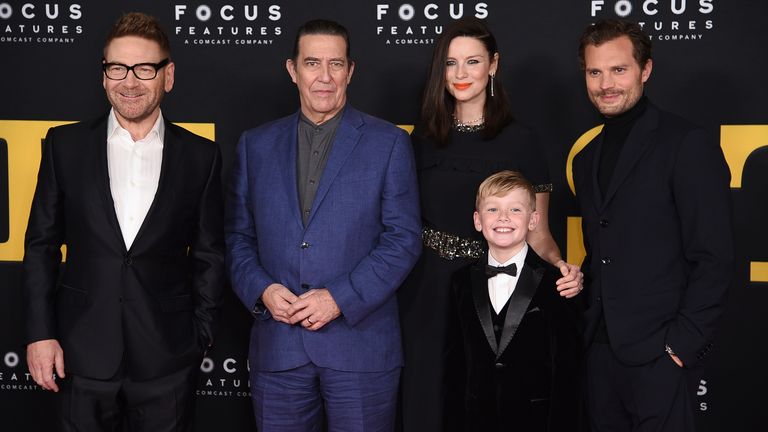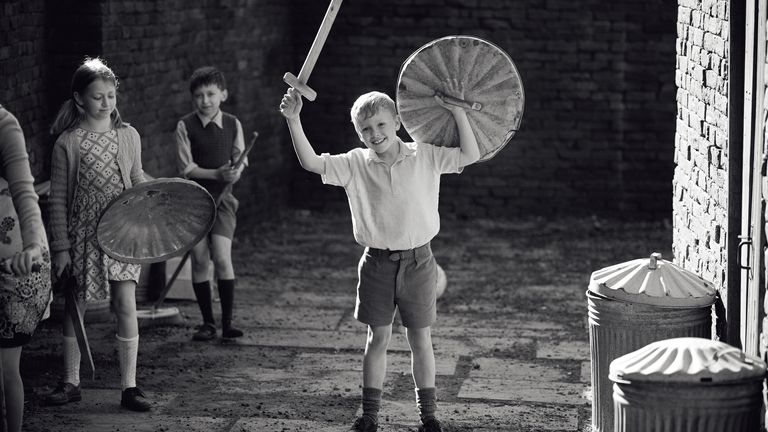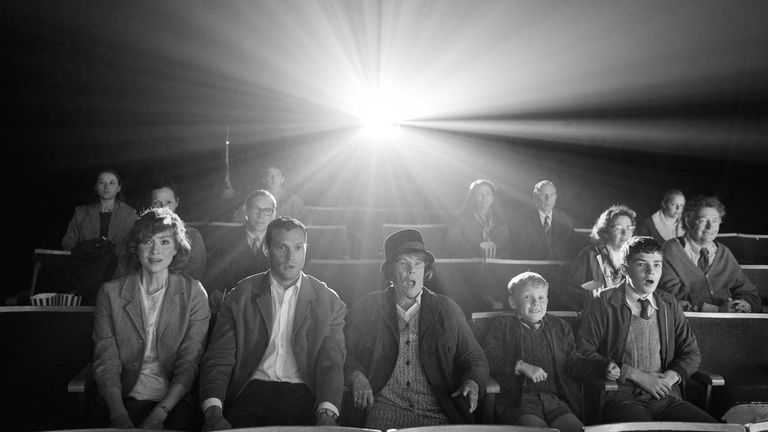
Sir Kenneth Branagh has said the “introspection” of lockdown helped him to write the film Belfast – his semi-autobiographical take on his childhood during The Troubles – giving him a “fresh perspective” on the emotional days of his past.
Speaking to Sky News, the 61-year-old director admitted he spent “about 50 years” agonising over how best to approach the subject.
“Basically, I didn’t want to just be staring at my own navel,” he said.
Golden Globes 2022 winners: The full list
“It wasn’t personal therapy, it was really to see whether the story of a family in a difficult situation – where humour and all the other coping mechanisms we come up with to try and deal with difficult times – could speak to other people.
“This lockdown promoted that, I think, because the introspection and the feeling unsettled that we’ve all shared really drove me back to that time.”
The movie is tipped to be a frontrunner at this year’s BAFTA and Academy Awards.
Starring Caitriona Balfe, Dame Judi Dench, Jamie Dornan, and 12-year-old Jude Hill, the film is seen through the eyes of a child, bringing with it a terrific warmth to a traumatic time in Anglo-Irish history.
“We chose to have the point of view of a nine-year-old boy and, in so doing, we didn’t cop out, I don’t think, but we avoided trying to get into what you might call politics in the overt sense.
“I’ve gone back and I’ve identified some key real experiences, the riot that I was part of, the looting of a supermarket that I got dragged into, various other minor criminal activities, like trying to steal Turkish delight, which failed entirely.
“It’s not to be so naive, it’s not to be infantilised or simply nostalgic or sentimental, but sometimes to try and look at the world, or maybe a very familiar or even over-familiar problem like The Troubles, from a fresh perspective and cinema – at this end of my career anyway – gave me a chance that I thought was very unusual from a position of authenticity.”
Growing up witnessing violence on the streets left the filmmaker with “a guardedness” which he’s always felt, he admitted.
He said: “I’d say the legacy of personality for me was a guardedness, a desire to escape, I think I escaped into acting, you know, if I want to be an amateur psychologist about it… because some inbuilt fear that being who you were or saying the wrong thing at the wrong time was going to bring more catastrophic change.”
While deeply personal, it is a story Sir Kenneth felt he had to tackle eventually.
“I wanted to try and embody a simple message of – without being too hippy-dippy about it – that you could be who you are, and who you are probably doesn’t change a great deal,” he said.
“This film was about revealing that to me and, in so doing, maybe allowing other people to recognise parts of their youth that are still with them and that they might positively access.”
Seeing the very start of The Troubles unfold on screen is a reminder of the long road that lay ahead before any semblance of peace would be seen in the region. Trust in politicians would be essential – something our current prime minister has been accused of forgetting.
When asked about Boris Johnson’s current fight to restore public faith, the director spoke of the importance of political trust.
“To have experienced peace up to nine years old, in my case, and then see what happened for the following 30 years and 3,700 deaths later.
“And then to understand and appreciate however imperfect, and it is, the process that was achieved through the Good Friday Agreement of ’98 is, to understand how every single day not only trust has to be won, but that peace has to be won, and the two things are interrelated.
Subscribe to the Backstage podcast on Apple Podcasts, Google Podcasts, Spotify, Spreaker
“Lest we forget. It is easy in the busy noise and cacophony of the contemporary world, with instant reactions to everything are required and instant justifications and all the rest of it that we take a moment. This film in my creative life represents taking a moment to appreciate that.”
While written as a deeply personal reflection on his youth, Belfast is also now a critical hit. After winning the People’s Choice Award at this year’s Toronto International Film Festival, it is tipped to clean up at this year’s BAFTAs and Oscars.
Although flattered, Sir Kenneth cautioned: “Lockdown has taught us that you can assume nothing!
“The fact that we made a film that we loved to be proud of and people are responding to – and that it opens this week – that’s exciting.
“Anything else? That’s just gravy.”











More Stories
Thuggizzle Water: A Legacy of Community Impact and Sustainable Innovation
A Talented Dancer Making Her Mark in the World
Jeremy Clarkson’s column about Meghan becomes most complained about ever